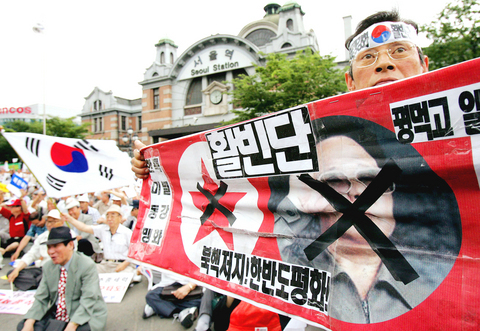China is not using its political and economic muscle to pressure North Korea to re-enter multilateral negotiations aimed at ending its nuclear weapons drive, US President George W. Bush's chief negotiator to the talks said Tuesday.
Christopher Hill, the Assistant Secretary of State for East Asian and Pacific Affairs, also said that the US and China were split over North Korea's alleged role as a nuclear proliferator and the prospect of its illicit atomic weapons falling into terrorist hands.
Hill gave a presentation titled "Dealing with North Korea's Nuclear Programs" at a hearing before the US Senate Foreign Relations Committee.

PHOTO: AP
Replying to remarks by panel chairman Senator Dick Lugar, Hill said: "I agree with you that China has been reluctant to use the full range of leverage that we believe China has.
"China has had North Korea as a close friend and ally for some 50 years now, and China has very close political connections, very close personal connections with the leadership, very close economic connections.
"And our request to China is to do what it has to do in order to bring them to the table," said Hill, the US leader to negotiations among the two Koreas, US, Japan, Russia and China.
North Korea has refused to participate in the nuclear talks after attending three rounds hosted by China, citing US "hostility." It has also rejected a US-led aid-for-disarmament plan and has instead been boasting about its nuclear prowess.
Hill said the US was not going to dictate terms with China on how to deal with North Korea.
China and South Korea have reportedly opposed US moves to pressure North Korea to give up its nuclear arms, rejecting calls for sanctions or ceasing crucial economic aid, but Hill said they were united in wanting to disarm Pyongyang of its atomic weapons.
"We're not going to tell them [China] whether they need to use economic leverage on their neighbor. But we're going to expect that, as the host to the process, that they figure out a way to get everyone to the table," he said.
"While there are differences on tactics, where the Chinese are reluctant to use pressure and, Mr. Chairman, as you said, the South Koreans are also reluctant to use that type of direct pressure, I want to emphasize there's absolutely no daylight between us on the issue of disarming North Korea," he added.
Democratic Senator Barack Obama asked Hill if China could still be a "sufficient leverage point" in getting the hardline Stalinist state back to the six-party talks or whether the US needed to work through other channels.

Indonesia yesterday began enforcing its newly ratified penal code, replacing a Dutch-era criminal law that had governed the country for more than 80 years and marking a major shift in its legal landscape. Since proclaiming independence in 1945, the Southeast Asian country had continued to operate under a colonial framework widely criticized as outdated and misaligned with Indonesia’s social values. Efforts to revise the code stalled for decades as lawmakers debated how to balance human rights, religious norms and local traditions in the world’s most populous Muslim-majority nation. The 345-page Indonesian Penal Code, known as the KUHP, was passed in 2022. It

US President Donald Trump on Friday said Washington was “locked and loaded” to respond if Iran killed protesters, prompting Tehran to warn that intervention would destabilize the region. Protesters and security forces on Thursday clashed in several Iranian cities, with six people reported killed, the first deaths since the unrest escalated. Shopkeepers in Tehran on Sunday last week went on strike over high prices and economic stagnation, actions that have since spread into a protest movement that has swept into other parts of the country. If Iran “violently kills peaceful protesters, which is their custom, the United States of America will come to

‘DISRESPECTFUL’: Katie Miller, the wife of Trump’s most influential adviser, drew ire by posting an image of Greenland in the colors of the US flag, captioning it ‘SOON’ US President Donald Trump on Sunday doubled down on his claim that Greenland should become part of the US, despite calls by the Danish prime minister to stop “threatening” the territory. Washington’s military intervention in Venezuela has reignited fears for Greenland, which Trump has repeatedly said he wants to annex, given its strategic location in the arctic. While aboard Air Force One en route to Washington, Trump reiterated the goal. “We need Greenland from the standpoint of national security, and Denmark is not going to be able to do it,” he said in response to a reporter’s question. “We’ll worry about Greenland in

Auschwitz survivor Eva Schloss, the stepsister of teenage diarist Anne Frank and a tireless educator about the horrors of the Holocaust, has died. She was 96. The Anne Frank Trust UK, of which Schloss was honorary president, said she died on Saturday in London, where she lived. Britain’s King Charles III said he was “privileged and proud” to have known Schloss, who cofounded the charitable trust to help young people challenge prejudice. “The horrors that she endured as a young woman are impossible to comprehend and yet she devoted the rest of her life to overcoming hatred and prejudice, promoting kindness, courage, understanding